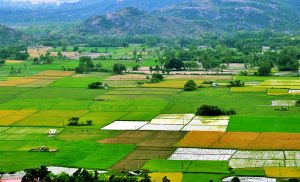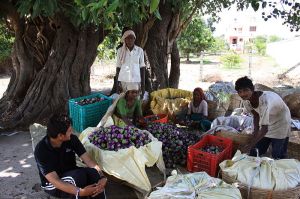Francisco A. Laguna & Annapurna Nandyal
By the mid-1990s, genetically modified (GM) technology had inspired food crops and revolutionized agriculture by thwarting several threats found in traditional farming methods. The obvious benefits of using GM seeds are that crops are more resistant to pests and environmental hazards, like temperature and drought, and, in turn, boost crop yields. This method of biotechnology became immensely popular in the United States, Canada and Argentina. Many considered it a boon to farmers to alleviate poverty and solve food security problems.
India is mainly an agricultural country with more than 60 percent of population employed in the sector. The Indian Government has been treading carefully concerning whether GM crops would be profitable for a massive young and growing economy, in contrast to the quick adoption by other developing BRICS nations like China and Brazil. India is a party to the international agreement Cartagena Protocol on Biosafety under the Convention on Biological Diversity, which consists of 166 countries members who have similar views and have emphasized a precautionary approach to Genetically Modified Organisms (GMOs).
 India was one of the earliest countries to establish a bio safety system for the regulation of GMOs. It established the Genetic Engineering Approval Committee (GEAC) within the Ministry of Environment and Forests (MOEF) in 1986. GEAC permission is required for field trials, cultivation and commercial release of all GM crops. After a slow start, in 2002, the GEAC permitted the first commercial cultivation of genetically engineered Bacillus thuringiesis (Bt) cotton, using seeds produced by Monsanto in collaboration with its Indian partner, Maharashtra Hybrid Seed Company (MAHYCO). The use of Bt cotton raised much controversy because of its mixed results. While some farmers benefitted from using the seeds, others accumulated substantial debts due to the high cost of GM seeds and low yielding harvest. Despite Bt cotton’s great promises, its cultivation in India was largely a deemed a failure because the hybrids produced in-country were unstable, unpredictable and ineffective in controlling pests.
India was one of the earliest countries to establish a bio safety system for the regulation of GMOs. It established the Genetic Engineering Approval Committee (GEAC) within the Ministry of Environment and Forests (MOEF) in 1986. GEAC permission is required for field trials, cultivation and commercial release of all GM crops. After a slow start, in 2002, the GEAC permitted the first commercial cultivation of genetically engineered Bacillus thuringiesis (Bt) cotton, using seeds produced by Monsanto in collaboration with its Indian partner, Maharashtra Hybrid Seed Company (MAHYCO). The use of Bt cotton raised much controversy because of its mixed results. While some farmers benefitted from using the seeds, others accumulated substantial debts due to the high cost of GM seeds and low yielding harvest. Despite Bt cotton’s great promises, its cultivation in India was largely a deemed a failure because the hybrids produced in-country were unstable, unpredictable and ineffective in controlling pests.
The Bt cotton debacle had negative impacts on other GM crops in India. In 2009, Bt eggplant was almost approved for cultivation and commercialization. In spite of encouraging results from various farm level trials and approval by the GEAC, the Ministry of Environment put approval on indefinite hold. Subsequently, India sued Monsanto and its Indian partner on bio piracy charges under the Biological Diversity Act 2002, accusing the company of stealing an indigenous crop (eggplant), which is a crime, and using it to create a modified version without permission from National Biodiversity Authority of India (NBA).
Industry argues that India discourages biotechnology and GM crops. The Government responds that it has consistently taken a pro-biotechnology stand but has struck a cautious note to protect many small farmer interests. Interestingly, according to the data compiled by International Service for the Acquisition of Agri-Biotech Applications (ISAAA), India is among the top 5 GMO crop growing countries.
TransLegal works to clients to identify rules and regulations affecting the importation, cultivation and commercialization of genetically modified crops and foods derived from genetically modified organisms. We also work to obtain approvals for the importation and use of GMOs for industrial purposes. Call us with your questions concerning GMOs in India and other parts of the world.


